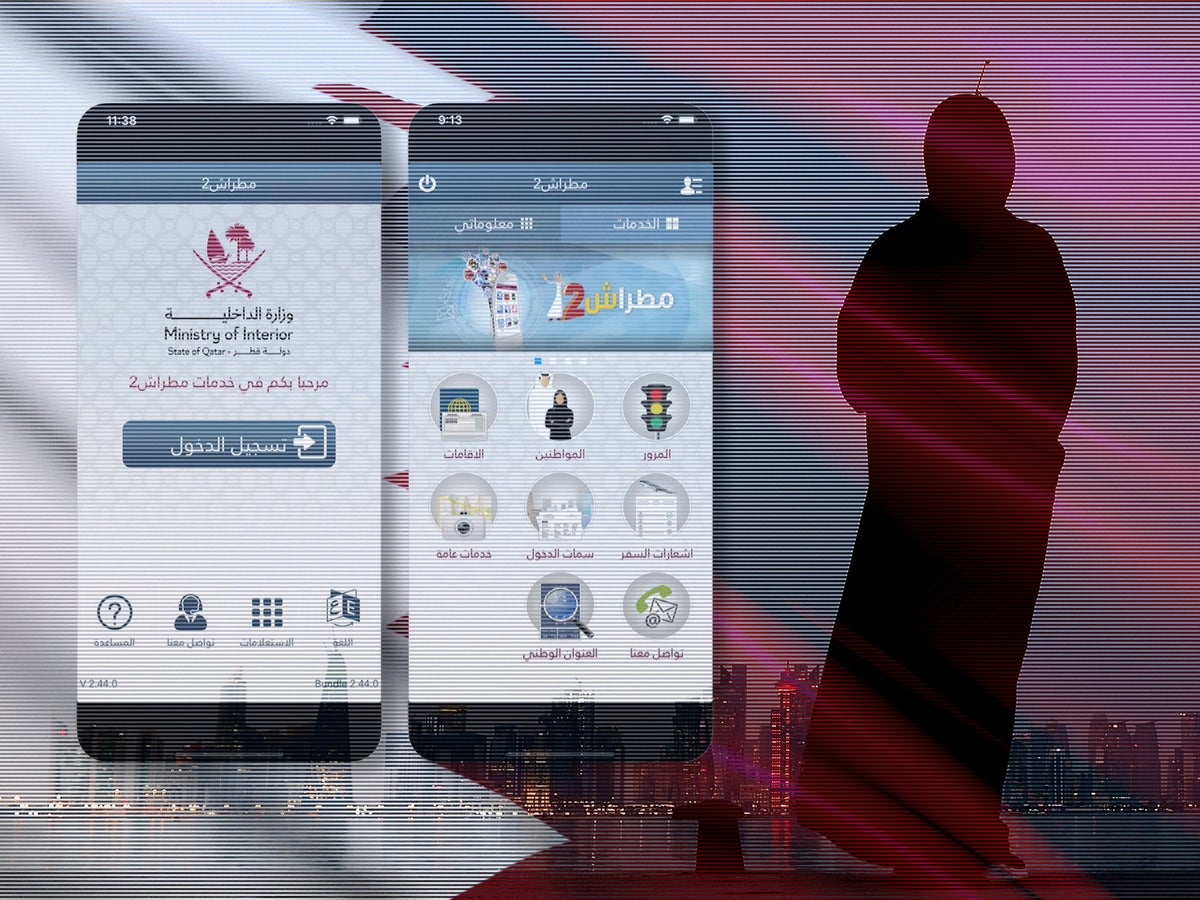
Google and Apple have been accused of facilitating discrimination by making an app available for download that men can use to stop unmarried Qatari women aged under 25 from leaving the country.
Under the Gulf state’s strict rules restricting human rights, single Qatari females aged 24 and younger have to obtain an exit permit with permission from a “guardian” – such as their father – to travel abroad. By stark contrast, Qatari men aged 18 and over do not.
The Qatari Ministry of Interior (MOI) app Metrash2 is available on Apple’s app store and Google Play – it has been downloaded more than a million times on the latter platform.
It is boasted that the free app offers Qatari residents “an easy way to access MOI services through their mobile devices”. In reality, by allowing guardians to approve or cancel exit permits, it effectively acts as a key for young unmarried women to leave Qatar.
The revelation again brings human rights issues in Qatar into sharp focus with the World Cup kicking off on Sunday.
James Lynch, co-director of human rights group FairSquare, said: “This is just the latest example of tech giants facilitating discrimination and abuse by apps using their systems in the Gulf.”
He added: “Tech giants have to get a grip on how the apps that sit on their platforms are actually used and the harms they can cause. By making apps such as Metrash2 available in its current form, they lend legitimacy of their brands to legalised gender discrimination, in this case against young women in Qatar.”

Human Rights Watch (HRW) has labelled the discrimination Qatari women face “systemic”, adding: “Women must obtain permission from their male guardians – who may be fathers, brothers, uncles, grandfathers and, when married, their husbands – to exercise many of their basic rights, including to marry, obtain a government scholarship to pursue higher education, work in many government jobs and obtain some reproductive healthcare.”
Last year, an HRW report stated: “Interior ministry rules require unmarried Qatari women under 25 years old to obtain an exit permit from their male guardian to travel abroad”, adding: “Human Rights Watch was unable to verify the legal basis for these rules. The Qatari authorities did not respond to Human Rights Watch’s questions relating to the requirement to obtain guardian permission to travel abroad.”
In 2017, the report explained, “Qatar introduced online applications on the website Hukoomi and mobile application Metrash2 to allow male guardians… to issue exit permits for their dependants – including children [and] unmarried women under 25”.
The report continued: “This online portal and mobile app provides other government services such as document services and driving licences.
“Qatar’s online portal and mobile app allows guardians two options: to approve an exit permit or to cancel an exit permit… It does not provide further options such as approval for multiple trips.
“While the introduction of the apps may have been designed to make providing such permission easier, it also means guardians can just as easily cancel such permission. Moreover, twelve Qatari women told Human Rights Watch that they experienced delays at immigration because the online system sometimes did not register the exit permit approval on the app or because the permit expires… Women themselves cannot check if they have an approved or expired exit permit, as this information is only available to their guardians.”
The report’s author, Rothna Begum, senior women’s rights researcher at HRW, told The Independent: “Instead of ending discriminatory male guardianship rules over women, the Qatari authorities have sought to use mobile apps like Metrash2 to enforce such control over women. Qatar should end its discriminatory requirement for Qatari unmarried women under 25 to have male guardian permission to travel abroad.”
HRW does not advocate the removal of the app because, Begum said, “that could lead to unintended negative consequences for some women who may surreptitiously change travel permissions on their male guardian’s phone, as happened in the case of one woman Human Rights Watch spoke to”.
However, she added: “Google and Apple should strongly urge the Qatari authorities to end discriminatory travel restrictions on women. Companies should always assess apps to determine whether they might undermine or violate rights, with extra scrutiny for apps developed or sponsored by governments. They should also revise their terms of service to prohibit apps expressly designed to violate rights and make every effort to mitigate any human rights harm before making such apps available.
“These travel restrictions on women contradict Qatar’s own constitution and laws, which guarantee equality before the law without discrimination on the basis of sex and freedom of mobility. It also violates international human rights law, which provides for women’s right to equality before the law and the freedom to leave any country, including their own, and that any restrictions must be necessary in a democratic society, clearly provided by law and proportionate to protect the rights and freedoms of others, and consistent with all other rights (eg equality and non-discrimination).”
Qatar’s e-Government website explains the process for applying for an exit permit. It states: “This service enables Qatari citizens to submit a request online, on the website of the Ministry of Interior (MOI), to issue exit permits to their sons and daughters. The permit is valid for seven days from the date of issuance.”
It adds: “This service is also available via Metrash2, as well as MOI self-service kiosks and service centres.”
On the same website, a page about Metrash2 states: “The ‘Metrash’ service enables citizens and residents to obtain a wide range of Ministry of Interior (MoI) services while enjoying the convenience of using their cell phones, such as… Exit Permit (EP) Services.”
Separately, the Qatari Ministry of Interior’s website states on a page about exit permits for Qatari females: “No permission is required for single women of 25 years or older (unmarried – divorced – widow) – from all segments of the society – to travel abroad. For those single women under 25 years, guardian’s consent is required to travel outside the country.”
For men, the webpage states: “No permission is required for those who are 18 years old or more as they have reached legal age of puberty.”
To publish apps on Google Play users need to sign up for a Google Play Developer account, for which there is a $25 one-off fee.
There is a $99 fee per membership year for Apple’s developer program to distribute apps but, its website states, a “government entity may be eligible for a fee waiver”.
Apple and Google declined to comment. The state of Qatar was contacted for comment. In response to HRW’s report last year, Qatar’s government communications office said in a statement: “Gender equality and female empowerment are central to Qatar’s success and vision. Qatar is an outspoken advocate for women’s rights at home and abroad.
“The Human Rights Watch report inaccurately portrays Qatar’s laws, policies and practices related to women. The accounts mentioned in the report are not aligned with our constitution, laws or policies. The government will investigate these cases and prosecute anyone who has broken the law.”







